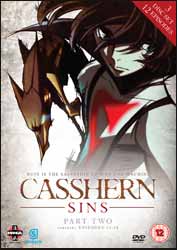|
Click here to return to the main site. DVD Review
Casshern - a cybernetic assassin with no memory of his past - awakens in a corrosive wasteland where nothing survives for long. A plague known as the Ruin sweeps across this once-vibrant world, reducing everything in its path to rubble and scattering any chance for salvation. Robots and humans alike - or what little remains of them - seek vengeance against Casshern for the life he took and the role he played in their Ruin. A machine built to kill, Casshern murdered the last hope for this world, but now, lost in a future he does not recognize, he will fight to save the dying... This concluding run of Casshern Sins more or less abandons the highly episodic, wandering nature of the series' first half, as the main plot element - the alleged murder by Casshern of the robot saviour Luna that brought about the end of world, and the persistent rumour that Luna has somehow returned - takes shape. With the cast established, the story switches between Casshern and his reluctant companions as they seek out Luna in search of answers and salvation, and Casshern's self-declared nemesis Dio and his lover Leda as they gather an army to crush their rivals, while the deposed robot emperor Braiking Boss - one of the few holdovers from the series' 1970s roots - watches and waits. As one might expect, while Luna does indeed prove to be real, her soothing presence and gift of healing are not quite as advertised, throwing the characters into disarray as their hopes and preconceptions are torn apart. These episodes are among the best in the series, portraying Casshern's turmoil and the other characters' reactions effectively, and - not to give too much away - the 'paradise' created by Luna is one of the most grotesque and memorable scenarios seen in anime. Casshern Sins, while admirably dedicated to its examination of redemption and happiness, is lacking in humour and often tends towards solemnity rather than real seriousness, such that its seeming aspiration to being a post-apocalyptic fairy tale has a tendency to fall into cliché. The female characters in particular suffer from this lack of subtlety: while Luna hits an interestingly sour note, the fighter Lyuze has little to do other than wrestle with her feelings towards Casshern, and Leda's persona is an unappealing mixture of Lady Macbeth and wicked stepmother that some will find off-putting given the character's potential. Despite these shortcomings, the series has the courage of its convictions and the eventual resolution is both meaningful and emotionally satisfying, a sadly unusual thing in TV anime where endings tend to feel like afterthoughts. The one area where Casshern Sins can't be faulted, though, is in spectacle: this is one of the most gorgeous-looking series in recent memory. As the characters draw closer to Luna's domain, the barren plains of the series' first half are gradually replaced by a succession of increasingly beautiful and lusciously rendered settings - a distorted landscape of stained glass, dizzying flower fields, warped and alien rocky geology that wouldn't look out of place in the illustrations of Moebius. The saturated colour palette fills all these otherworldly locations with an unnatural air that perfectly captures the twisted nature of the new world created by Luna's murder and resurrection long before she reappears. The soulful folk-rock and dramatic orchestral score perfectly complement the visuals, and as mentioned in the first season review, the voice cast - mostly veterans, refreshingly for the youth-fixated modern anime market - are uniformly superb. On an aesthetic level Casshern Sins is a wonder, and it's a real shame that poor sales of the first season's Blu-ray edition have obliged Manga to stick to a DVD-only release for the second half. In conclusion, while the story has its faults, this is still one of the best and most lovingly created television anime of the last few years and a title for anyone's collection. 7 Richard Hunt |
|---|

